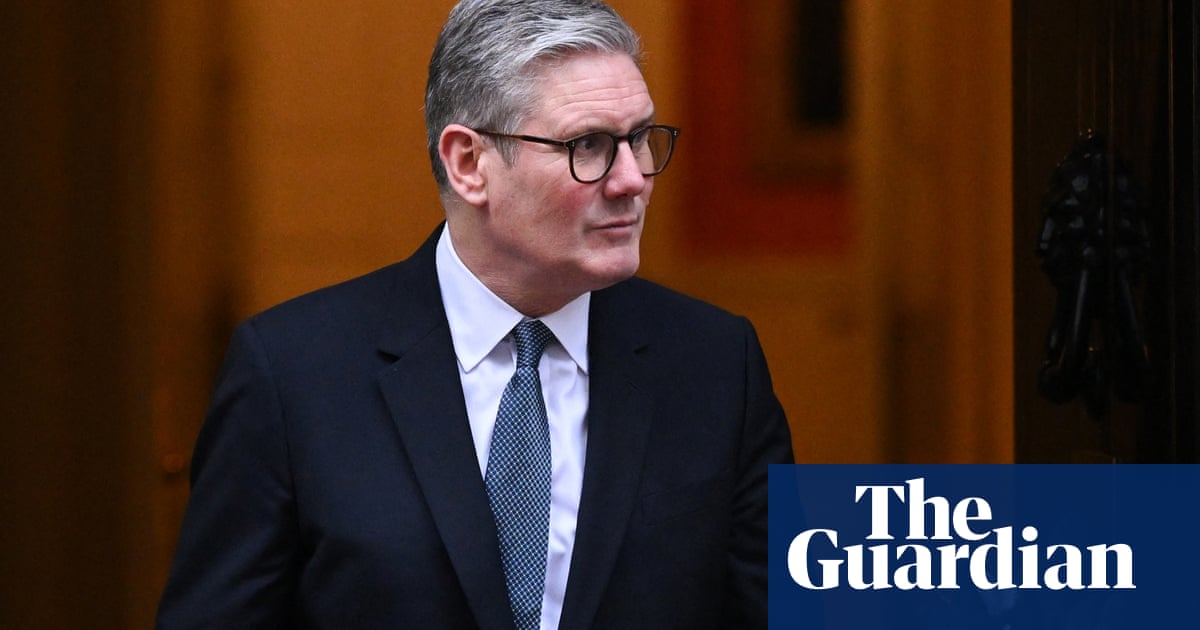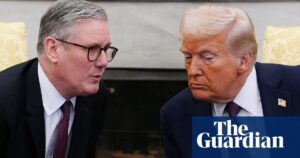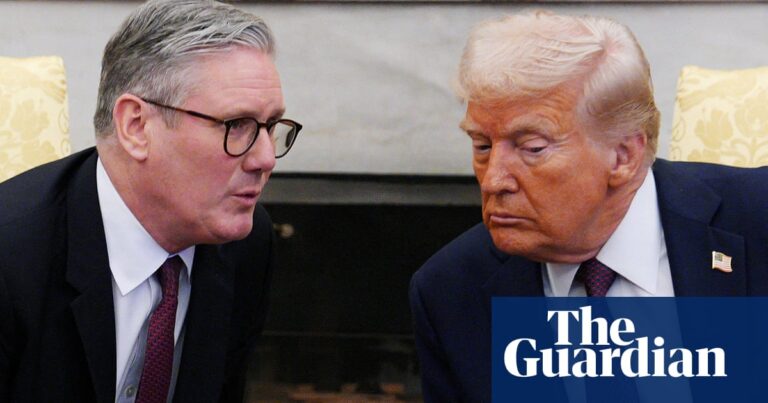
Keir Starmer has welcomed the collapse of Bashar al-Assad’s “barbaric regime” in Syria and called for civilians to be protected after rebel forces took control of Damascus.
In a statement hours before his first trip to the Middle East, the prime minister said the developments in Syria were “unprecedented” and called for a political solution to the vacuum in power.
“The Syrian people have suffered under Assad’s barbaric regime for too long and we welcome his departure,” Starmer said. “Our focus is now on ensuring a political solution prevails and peace and stability is restored.”
He called on all sides to protect civilians and minorities and to ensure aid can reach the most vulnerable, and said the UK government was speaking to its partners in the region.
Starmer was due to fly to the Gulf on Sunday night. He will meet the UAE president, Sheikh Mohamed bin Zayed, on Monday before travelling to Saudi Arabia for talks with its Crown Prince, Mohammed bin Salman.
The meetings are sure to touch on the political situation in Syria after Assad, who has waged a bloody war against his people since a rebellion against him 13 years ago, was unexpectedly ousted by a lightning rebel offensive.
“If Assad’s regime has fallen I welcome that news,” Angela Rayner, the deputy prime minister, told Sky News’s Trevor Phillips earlier on Sunday. “What we need to see is a political resolution in line with the UN resolutions. We need to see civilians and infrastructure protected. Far too many people have lost their lives; we need stability in that region.”
Rayner said the government had been working to evacuate British citizens from Syria over the weekend and would continue to support them. Russia, a staunch ally of Assad, issued a statement confirming that he had left office and the country.
The leading insurgent group in Syria is Hayat Tahrir al-Sham (HTS), which was proscribed as a terrorist organisation in the UK on the basis that it was an alternative name for al-Qaida. It is also designated as a terrorist organisation by the UN.
The developments prompted fresh scrutiny of Labour’s decision under Ed Miliband to oppose British military intervention against Assad’s regime in 2013. A stunned David Cameron ruled out British involvement in Syria after losing a Commons vote by 13 votes.
David Taylor, the Labour MP for Hemel Hempstead and a former charity worker, said on X that “from 2013 this has been a truly shameful chapter in our party’s history and should never be allowed to happen again”.
Taylor told the Guardian: “For many years I supported Syrian activists in the UK in calling for a no-fly zone to protect Syrians from Assad and Putin, as Jo Cox did, and I’m convinced that if we’d done that half a million people would still be alive. It’s well documented that [Jeremy] Corbyn and co spent more energy casting doubt on whether chemical weapons were being used than on ways to protect civilians. I’m glad our party has moved on from this period.”
Asked about Miliband’s decision in 2013, Rayner told Times Radio: “Parliament decided and that’s the right way. We have a democratic process in the UK … I think what we’ve got to do is focus on how we take stability forward in the region.”
In 2015, Jeremy Corbyn opposed Cameron’s proposed airstrikes against Islamic State in Syria but gave Labour MPs a free vote to prevent a mass revolt. The Commons overwhelmingly backed the action after 66 Labour MPs sided with Cameron’s government.
Ben Bradshaw, a former Labour foreign minister who stepped down as an MP this year, said on X that Labour “opposing Cameron’s motion in August 2015 was a shameful moment in our party’s history and one [we] must never repeat”.
Starmer and Rayner both voted against the strikes, despite Labour MPs having a free vote. A total of 11 members of the shadow cabinet voted in favour, including the then shadow foreign secretary Hilary Benn.
The now home secretary, Yvette Cooper; the transport secretary, Heidi Alexander; the science secretary, Peter Kyle; the education secretary, Bridget Phillipson; the chancellor of the duchy of Lancaster, Pat McFadden; and the Commons leader, Lucy Powell, all backed Cameron’s airstrikes in 2015.
John Sawers, a former head of MI6, said the government should review its proscription of HTS because it had cut ties with al-Qaida over the past decade.
Sawers argued it would be “rather ridiculous” not to be able to engage with the rebels who had taken control of Syria because of the group’s proscription. “I think Abu Mohammed al-Jolani, the leader, has made great efforts over the last 10 years to distance himself from those terrorist groups and certainly the actions we’ve seen of Tahrir al-Sham over the last two weeks has been those of a liberation movement, not of a terrorist organisation,” Sawers told Sky News.
“So, I think the home secretary will be asking MI5 and the joint terrorism assessment centre for a review of the situation about Tahrir al-Sham and whether it should remain on the proscribed entity list.”
The Home Office said it recognised that HTS’s relationship with al-Qaida had changed, as there had been a “splintering between the two organisations”.
A spokesperson for the department said the government did not routinely comment on whether a group was “being considered for proscription or deproscription”. “The situation on the ground in Syria is very fluid,” they added. “The priority must be the safety of Syrian civilians and securing a political solution to the unfolding events.”
Priti Patel, the shadow foreign secretary, said the Conservatives wanted to see the “right kind of outcome, put the Syrian people first, but also look at the sort of governance structures that could occupy Syria going forward”.
Source: theguardian.com
















